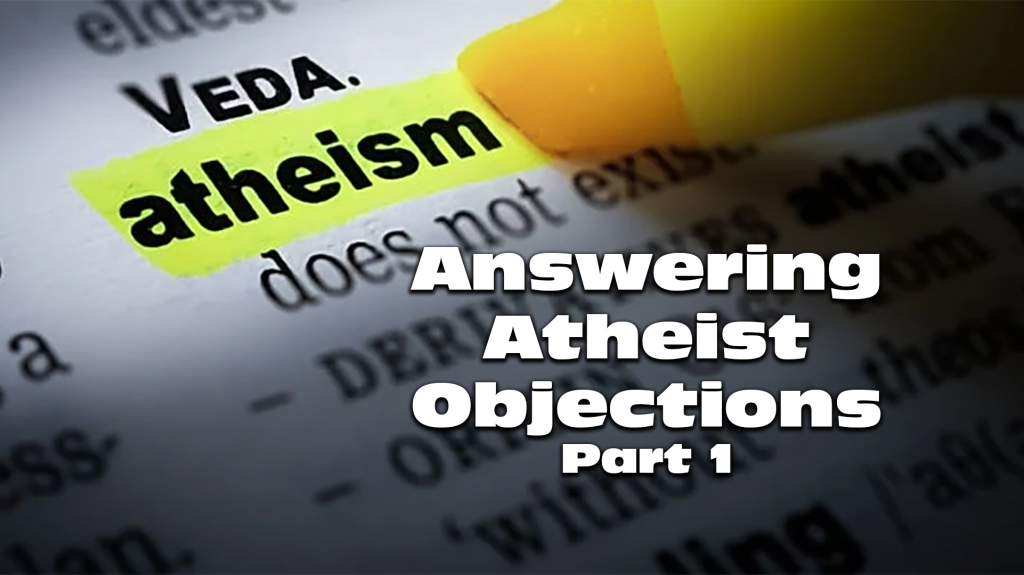[Part 1 of a 3-part series]
What follows is a response to an article that appeared in mid-July of 2024, titled “18 Uncomfortable Questions Atheists WANT Religious People to Address.” It was posted on the “Grace for Single Parents.com” website. The author was Lily Blackwood.
I’m not sure how the article fits the seeming aim of the website – supplying grace to single parents, but it deserves a response, nevertheless. If atheists really want religious people to address these eighteen things — I’ll bite.
And I start there – with the contention by the author that atheists want answers from people of faith. That’s not been my experience, nor that of those I know.
Today, those who identify as “atheists” do so precisely because they’ve concluded religious people can’t answer the questions that have led them to unbelief. In my encounters with atheists, they pose challenges against faith. They do not ask questions to find support for it.
Let’s dive into the article. Blackwood begins with some introductory remarks, then gets to the first of her “18 Uncomfortable Questions”
1) Is There Proof that God Exists?
Blackwood explains the problem this way – While religion requires faith, science requires proof. The assumption is the false premise that faith and evidence have nothing to do with each other.
That’s not the case. Biblical faith is NOT a blind leap in the dark, as some contend. Faith is a reasoned and reasonable response to evidence.
The proof God exists is that anything exists.
We know things exist because our five senses tell us they do. For a thing to exist, it must have come into existence. That is, it owes its existence to some previous cause. And a thing that comes into existence due to that prior cause cannot itself BE greater than what caused it. Because what IS greater is new, something that did not exist before. But we can’t go back in an infinite regression. There has to be, there must be, a starting point. Logic requires it.
Again: Everything in the physical universe owes its existence to some prior and greater cause. If true, even the Big Bang had to have risen from some prior cause. Follow me now – if there was ever – nothing, what would there be now? Because nothing is No Thing. And nothing can do nothing.
So, if there is something now, then logic, not religion, not faith, logic requires that there has always been something that owns its own existence – Something uncreated, uncaused, and eternal with the capacity to bring everything else into existence. That is precisely what we mean by the God of the Bible. That God is THE father of logic, Aristotle’s, Unmoved Mover. The Uncaused Cause.
And it just so happens to be the Apostle Paul’s point in Romans 1:20 when he says, “For since the creation of the world His invisible attributes are clearly seen, being understood by the things that are made, even His eternal power and Godhead, so that they are without excuse.”
2) If God Exists, Why Is There Suffering?
This challenge by skeptics has always seemed especially weak to me. The skeptic has to assume that God is good, loving, and powerful to pose this challenge. But they don’t realize their posing it as a challenge assumes the existence of the very God they then deny.
If there is no God, as the atheist assumes, then there’s no basis for this challenge. The skeptic has to first posit that suffering is bad. That it’s something objectionable. But if there’s no God – there’s no objective morality. Neither right nor wrong. No good or evil. Just chemistry and physics. Suffering is naught but chemical reactions in biological machines. Who’s to say it ought not be?
This challenge seems to work precisely because deep inside, even the hardened skeptic is outraged at gross injustice and the suffering of the innocent. Whence the moral outrage and kicking at the goads of God – unless there’s an inner witness to the Creator Who left His image in His creation?
Rather than the existence of suffering being an argument against God, it’s powerful proof something’s very wrong in the world He made. Finding out what went wrong is part of the adventure of Faith In God.
3) Why Are There So Many Different Religions?
Is this really something atheists want to know? If so, I guess the challenge is that there being many religions means none are right.
That doesn’t follow. There are many economic theories and forms of government. That doesn’t mean any work. One or two may, while others don’t.
This is important because it reinforces the internal consistency of the Christian Faith. The existence of many religions, ideologies, and philosophies is precisely what we’d expect since the Bible states that there’s an enemy of God named Satan who can be expected to create confusion by promoting beliefs contrary to truth.
4) If The Big Bang Theory Created Earth, How Was There a Creator?
The Big Bang doesn’t dismiss the logical need for a self-existent and eternal Creator.
Since I just touched on this, I’ll be brief now. If there was a Big Bang, how could there not be a Creator? Where’d the physics for it come from?
Again – if there was ever a moment when there was nothing, there’d be nothing now since nothing is Nothing, and Nothing can do nothing. That there is anything now necessarily means there has always been Some uncaused thing – which is precisely what we mean by the Creator God of the Bible.
I remember hearing some years ago that a highly respected and brilliant physicist said that there was no need for a Creator because something could, in fact, come from nothing. He said that ripples in the quantum field were sufficient to get it all started.
This is what happens when people with high IQs dispense with God. They lose the ability to reason soundly. Last time I checked – ripples and a quantum field aren’t nothing. They’re something.
I don’t know. Maybe that’s how the universe came into being. But all this does is move the entire cause-and-effect scenario back a step. We’re still faced with the challenge of – Where the quantum field came from and what made it ripple.
[This ends part 1 of a 3-part series]

Lance is the founding and lead pastor of Calvary Chapel Oxnard where he has served since 1982. Lance & David Guzik co-pastored the church for six years before David planted a church in a nearby community.
Lance & his wife Lynn were married in 1980 and have three adult children and five grandchildren. Lance loves teaching the Bible, History, and Leadership. He holds Masters-of-Arts in Biblical Studies and Ministry.
Lance serves as a chaplain for both the Oxnard and Port Hueneme Police Departments and enjoys backpacking, wood-working, working out, gardening, home improvement projects, reading, and graphic design.
The popular Communio Sanctorum: History of the Christian Church podcast can be found in both audio and video at the Into His Image website along with a growing inventory of Lances teaching.




